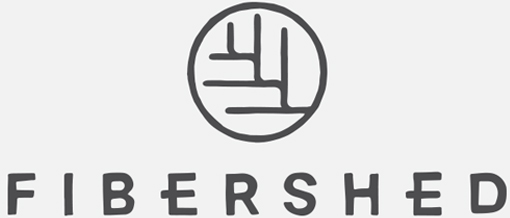Written by Sasha Wirth Photographed by Hubbard M Jones
“You can do anything, but you can’t do everything,” muses Gynna Clemes, arranging her bespoke cardigans and t-shirts on an outdoor rack while her toddler, Hank, weaves happily between the clothing. Then he takes off and scurries to a table piled high with socks and home goods.
“Mama made,” he says proudly, pointing to a stack of washcloths, before disappearing underneath the table to play. Clemes smiles. Motherhood itself has been both the catalyst and inspiration for the evolution of her business Gynna Made – a zero-waste, made-to-order clothing and home goods line – while also a test for her entrepreneurial spirit. As someone with a strong, self-taught approach to life, there are endless interests, directions and possibilities that await. But there’s nothing like parenthood to make establishing priorities and pulling focus essential.
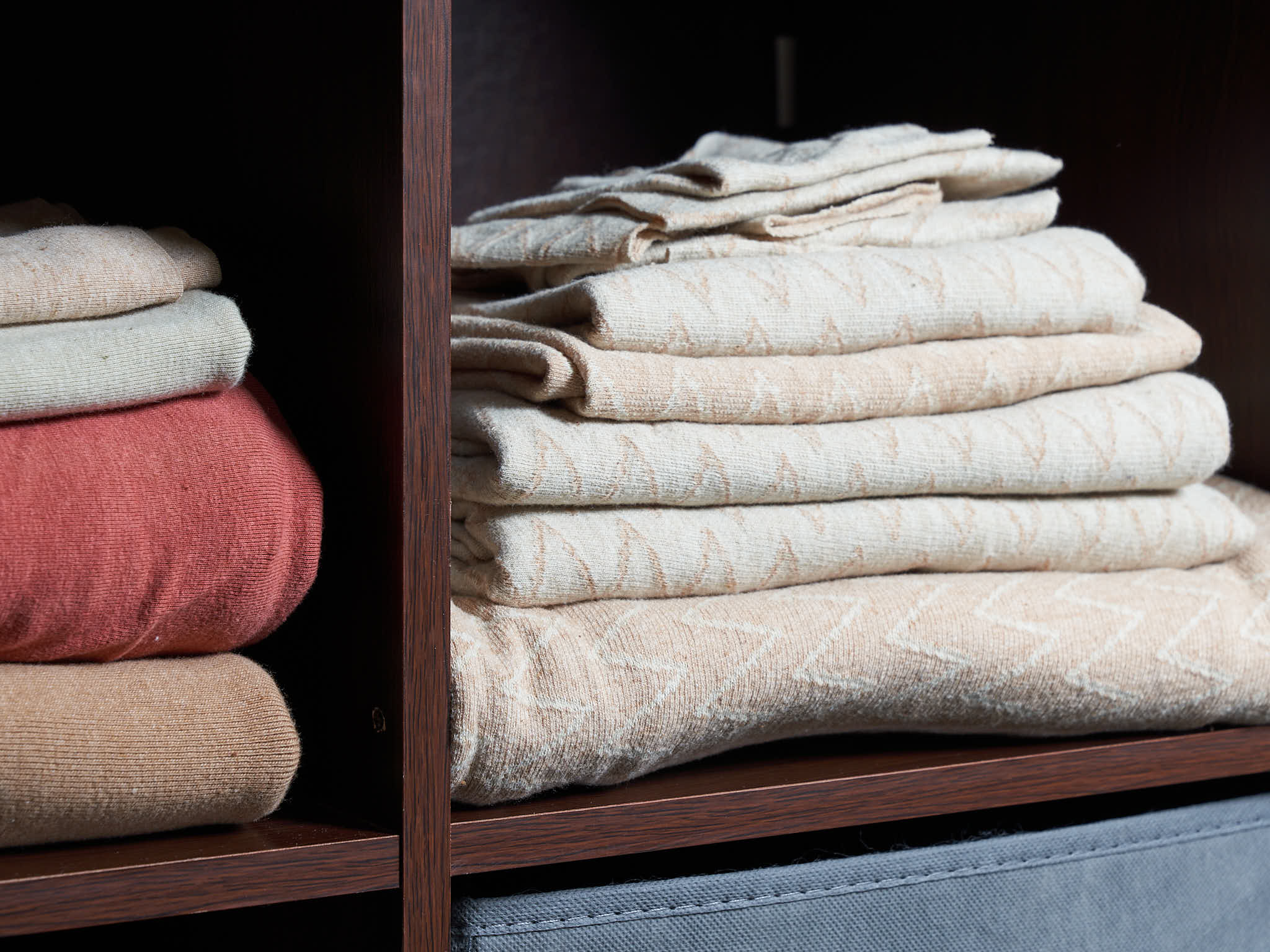
“There is a time and a season for everything,” she explains. “But that doesn’t mean you stop dreaming and planning. You realize that everything goes in spurts and that having a creative outlet is key. Just because something isn’t happening now doesn’t mean that it never will.”
It’s a philosophy that has served her well, allowing her to continue creating and growing her business while also balancing the needs of her family.
“I’ve been an entrepreneur since I was a child,” she says. “When I was ten years old, my brother and I would go to Sam’s Club and purchase big boxes of candy bars to sell around the neighborhood. We’d also mow lawns and pick weeds. But whereas my brother was more hesitant about asking for payment, I’d smile sweetly, extend my hand, and ask for what I’d earned.”
This confidence helped Clemes launch her first business, GRABstuff Creations, on Etsy shortly after college. “At the time I was hosting weekly knit nights and making project bags. Friends saw the bags and encouraged me to sell them, which I did successfully for five years.”
Along with meeting every week, the knitting group also attended events together. The 2010 Lambtown Festival was coming up and they decided to sign up for a few classes. One workshop in particular caught Clemes’ eye: a private class taught by Fibershed’s Robin Lynde from Meridian Jacobs, a sheep farm and weaving studio.
“When I get a bee in my bonnet, there’s no stopping me,” she grins widely. “I sure get a lot of them, and when I came across the weaving class I knew it was something special!”
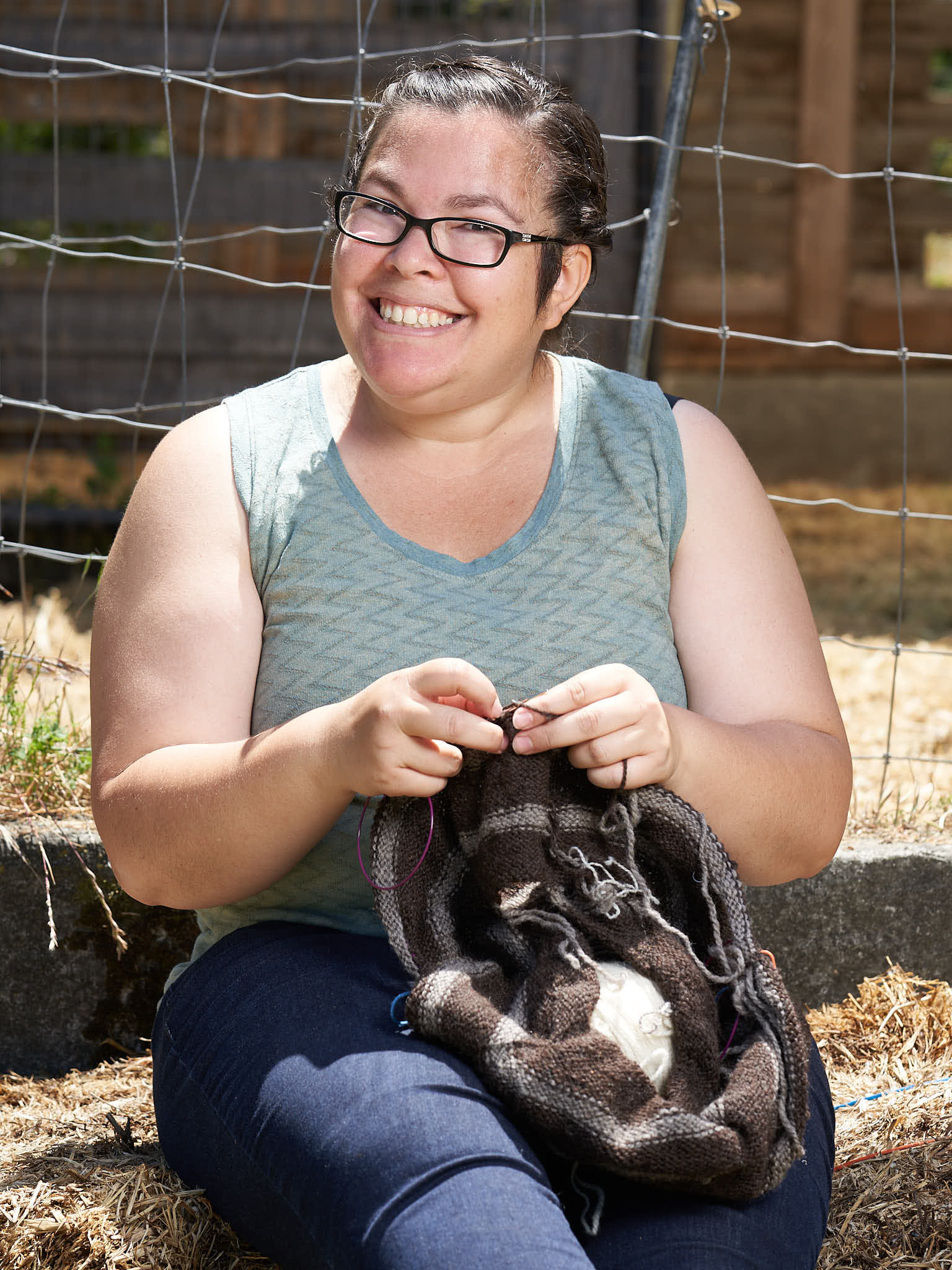
The workshop intrigued her so much that Clemes couldn’t wait for it to start. She went out and purchased a loom before the first day of class to experiment with. When the day finally came, she enjoyed herself immensely. Lynde noticed, and mentioned she might like to try spinning.
“I have too much going on. I’m not going to learn how to spin,” responded Clemes with a sigh.
“Not yet,” countered Lynde encouragingly. “You aren’t going to learn how to spin yet.”
That one word – and the mindset shift that went along with it – would go on to impact both Clemes’ personal life and her next entrepreneurial leap. “The way I see it, nothing is discounted. Everything is embraced. But in its own time,” she emphasizes. And paired with her self-starter attitude, which approaches “rules as mere guidelines,” she has been able to use her time both wisely and creatively.
When Lynde began Farm Club, a membership program where individuals help with farm chores, events and participate in hands-on learning opportunities at Meridian Jacobs, Clemes jumped at the chance to join. Through her burgeoning relationship with Lynde, she eventually found herself involved with Fibershed (becoming part of the Fibershed Marketplace and the sixth member of the Fibershed Co-op), meeting local dyer Brooke Sinnes from Sincere Sheep, and bringing home two sheep from Meridian Jacob’s flock.
“I had admired Brooke’s beautiful yarns and fibers for so long that it was incredible to meet her and learn more about her natural dyeing techniques,” she says enthusiastically, adding with a cheeky grin: “Though I’m not a dyer. Yet.”
She is, however, well on her way to becoming one. With Hank leading the way up a path that winds around a tiered garden, Gynna points out indigo seedlings in a makeshift greenhouse and a raised bed filled with madder, which will be ready for dyeing projects next summer. There’s also a loquat tree and a vegetable patch. And, of course, the perfect spot for a dyeing vat.
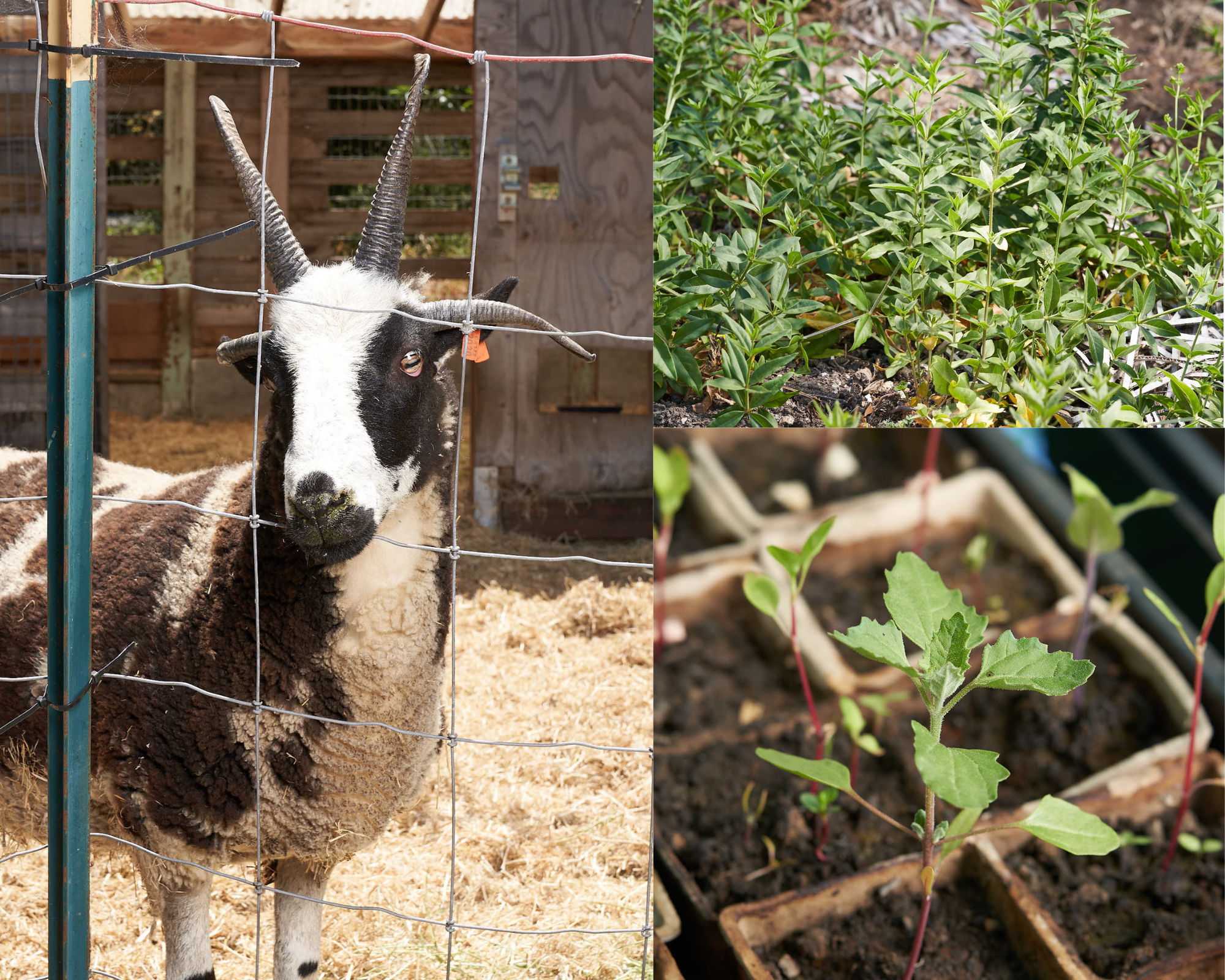
Hank has sprinted ahead and is excitedly yelling “Billy! Rachel!” With his bouncing auburn curls and wide smile, he turns around clutching handfuls of straw. He’s brought everyone to a picturesque barn and enclosure where Billy (a one-year-old Jacob ram) and Rachel (an eight-year-old half Blue-faced Leicester and half Jacob ewe) eagerly trot to the fence for their mid-morning snack.
“It’s a family business,” laughs Clemes, watching her son expertly feed the sheep. “When I’m out here gardening, he’s right next to me weeding and planting seeds. Or after watching our sheep get sheared, he was busy ‘shearing’ all of his stuffed animals for days. Then there are the times I’ll be spinning or weaving and he’s right beside me. Lately he keeps saying ‘Swish! Thump! Pump!’, so we are going to let him try spinning for his third birthday. It’s all enmeshed.” She pauses. “In many ways it has to be when you are both a mother and an entrepreneur.”
Though the current vision for keeping the sheep is to collect enough wool to spin and weave into a king-size blanket for their bed (using a design that Clemes made for her husband Roy’s wedding vest), she admits that could be just the beginning. Opportunities can arrive when one least expects it, like when her father-in-law was at Black Sheep Gathering and came across a refurbished circular sock knitting machine from 1919. With his vast knowledge of fiber arts equipment as the founder of respected Clemes and Clemes Inc., he purchased it on the spot. The seller agreed to give Clemes a 30-minute lesson and that’s all it took to get her hooked and envisioning how she could use it to grow her business.
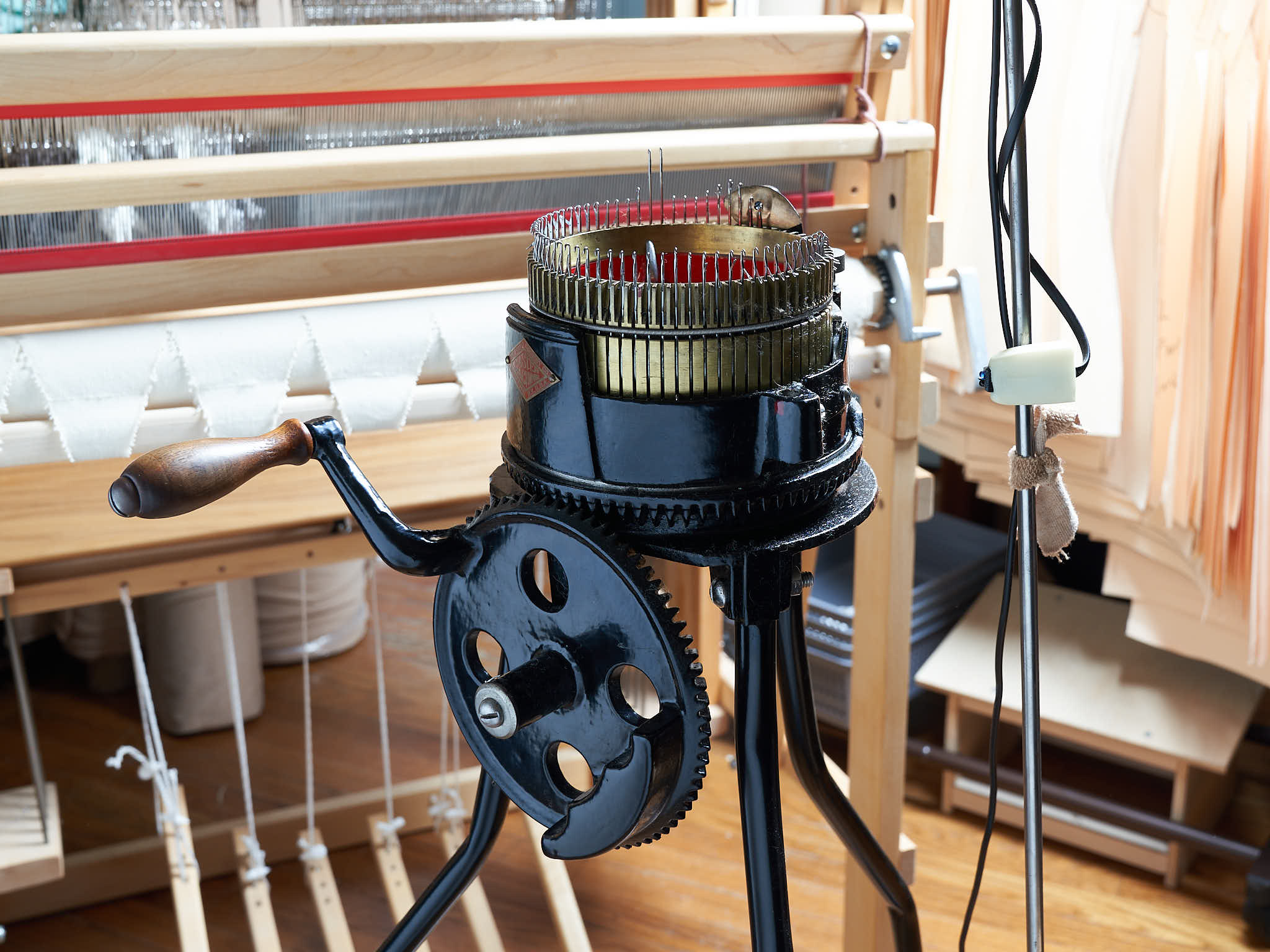
“It was 2016 and I had just started Gynna Made after working for a while in a regular job. I was still creating, but had needed a break from my Etsy shop. When I began Gynna Made, I was making and selling reusable dishcloths, coasters and home textiles. The addition of the circular sock knitting machine, however, enabled me to expand my business into making hand-cranked socks, headbands, beanies and holiday decorations. It was wonderful!”
But then came a series of life-changing events. There was the birth of her son, followed by the disruptive COVID-19 pandemic. The part-time work she had been doing was no longer possible, and there were no craft events to showcase Gynna Made products. Suddenly she found herself isolating at home with an infant, feeling a bit lost.
It is said that necessity is the mother of invention, but entering the state of motherhood itself can be a driving force for innovation. For Clemes, the two would converge and take her business in a new and exciting direction.
“Though I was a homebody at heart and felt happy being at home with my son, I needed a focus,” she admits. “I needed a break from making face masks and Hank needed new clothes. He was constantly outgrowing everything, and I wanted to design with intention. Fast fashion is so detrimental to the environment, and most children’s clothing is made from polyester, which overheats their growing bodies. I knew I’d have a happier, healthier child in natural fibers.”

She remembered discovering organic and non-GMO cotton made by local fiber pioneer Sally Fox (founder of Vreseis Limited) at the Fibershed Symposium in 2019. It was her first outing post-baby, and seeing the beautiful, naturally-colored cotton struck a creative cord. She bought some to make a pair of shorts for Hank, and as she held up the finished product there was a familiar buzzing in her ear.
“Another bee in my bonnet!” she smiles, her face lighting up. “I went ahead and ordered rolls and rolls of Fox’s cotton, funding the business with a pre-order for my [now] signature cardigans. They would become the staple pieces of my new clothing line, and the Hank + Momma business took off from there, expanding into a women’s and children’s capsule wardrobe line.” She takes a satisfied breath. “I got my creativity back!”
The tiny shorts are still hanging up in her Northern California home sewing studio, which she fondly calls her “relaxing zone.” The shelves are neatly organized and lined with cones of yarn. There are design sketches displayed on the wall and sizing patterns hung on a rack. A line of Brother serger machines sits behind her antique circular sock knitting machine, ready to tackle the orders that come in.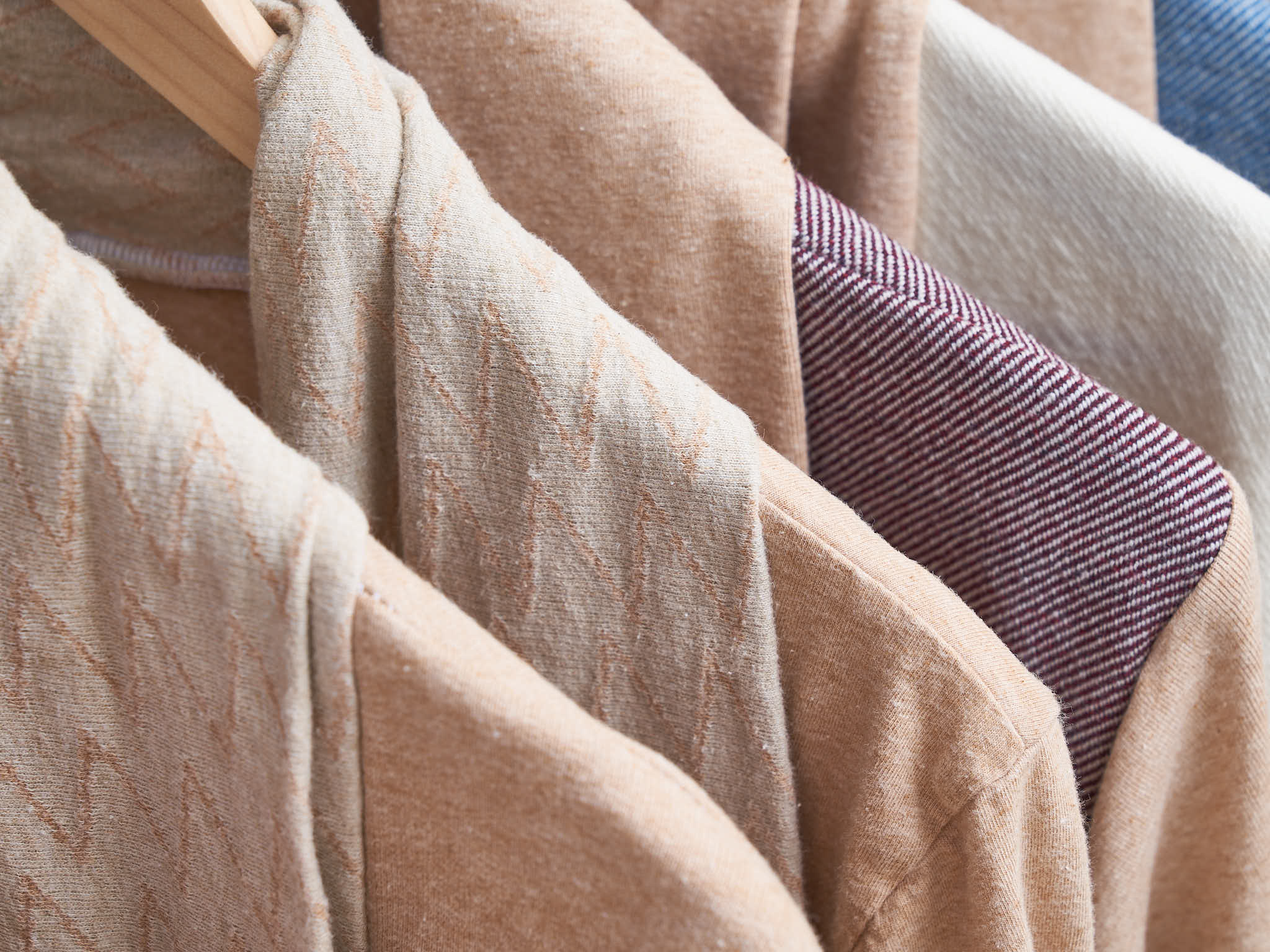
Everything from the materials used to the manufacturing process is sustainable at Gynna Made. Each piece of clothing is made-to-order, essentially creating zero waste. Scraps are used for stuffing, mending or are composted. All designs go through a rigorous six-month wear-and-test period. And Hank, naturally, is the ideal tester (and adorable model) for the children’s line.
“The clothing you wear has to be comfortable, like a second skin. You should almost forget you are wearing it. And it has to be designed with the utmost consideration. I’m constantly thinking ‘What will you do with the clothing? How will it be used? Worn?’ For kids, it has to stand up to lots of wear – running, painting, climbing, accidents. Hank will always choose his ‘momma-made’ clothing when given the choice. But the women who buy my clothing are busy and active as well. Each piece has to serve multiple purposes and be made of high-quality fibers so that it lasts a long time.”
Unlike other clothing designers who outsource fiber procurement and production overseas, all Gynna Made products are proudly American-made. Each item is made from 100% Organic Cotton FOXFIBRE® COLORGANIC® fabric sourced from Vreseis Limited. It’s a blend of “Coyote” brown cotton grown in California blended with organic acala white cotton grown in New Mexico. The cotton then makes its way to North Carolina where it is spun and knit into fabric, before returning to Clemes to be made into classic wardrobe staples like cardigans, jackets, t-shirts and more. New items are introduced after much thought and only if they fit seamlessly with what is already on offer. Clemes does not follow the wasteful ‘new line every season’ model popular in the fashion industry. Instead, she has her eye on helping customers build smaller, curated wardrobes.
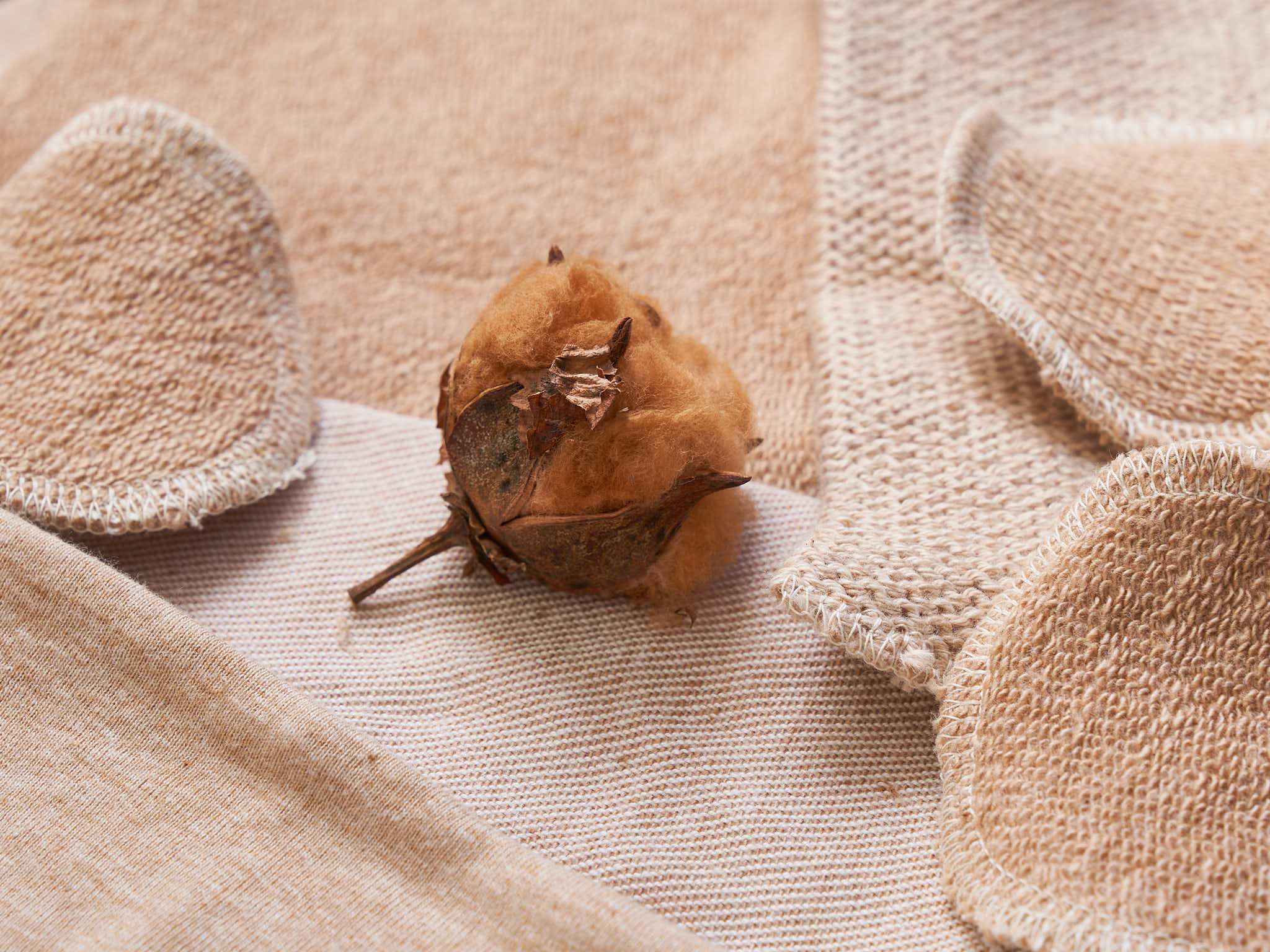
“My favorite orders are people starting their capsule wardrobes. It’s intentional slow fashion. We don’t need overstuffed closets. To take on the world, we need to feel comfortable – and clothing is such a fundamental part of how we show up,” she says. “And it can start with feeling good about what’s hanging in your closet.”
It also goes hand-in-hand with the intention Clemes bring to the design and sewing process. “I believe that wearing a homemade wardrobe is grounding. For me personally, it’s such a tactile experience. I know who grew the fabric. I can lean into every step and every stitch of creation. For some people, that sense of grounding is walking barefoot in the grass. I connect through using my hands, putting love and attention into each garment.” She happily holds up a tiny baby hat. “And thinking only good thoughts when making these sweet little things.”
With a two-week turnaround time for each order, she’s able to keep Gynna Made sustainable in all ways – for herself, her family and the business. It can be a juggle at times, but the peace, satisfaction and joy in her work is something that Clemes is eager to share with others.
“I want to inspire others to create!” she declares. To date, she’s already offered a few workshops on hand sewing and a T-Shirts 101 class. But her next goal is to expand into online tutorials with kits containing pre-prepared fabric that is cut to size.
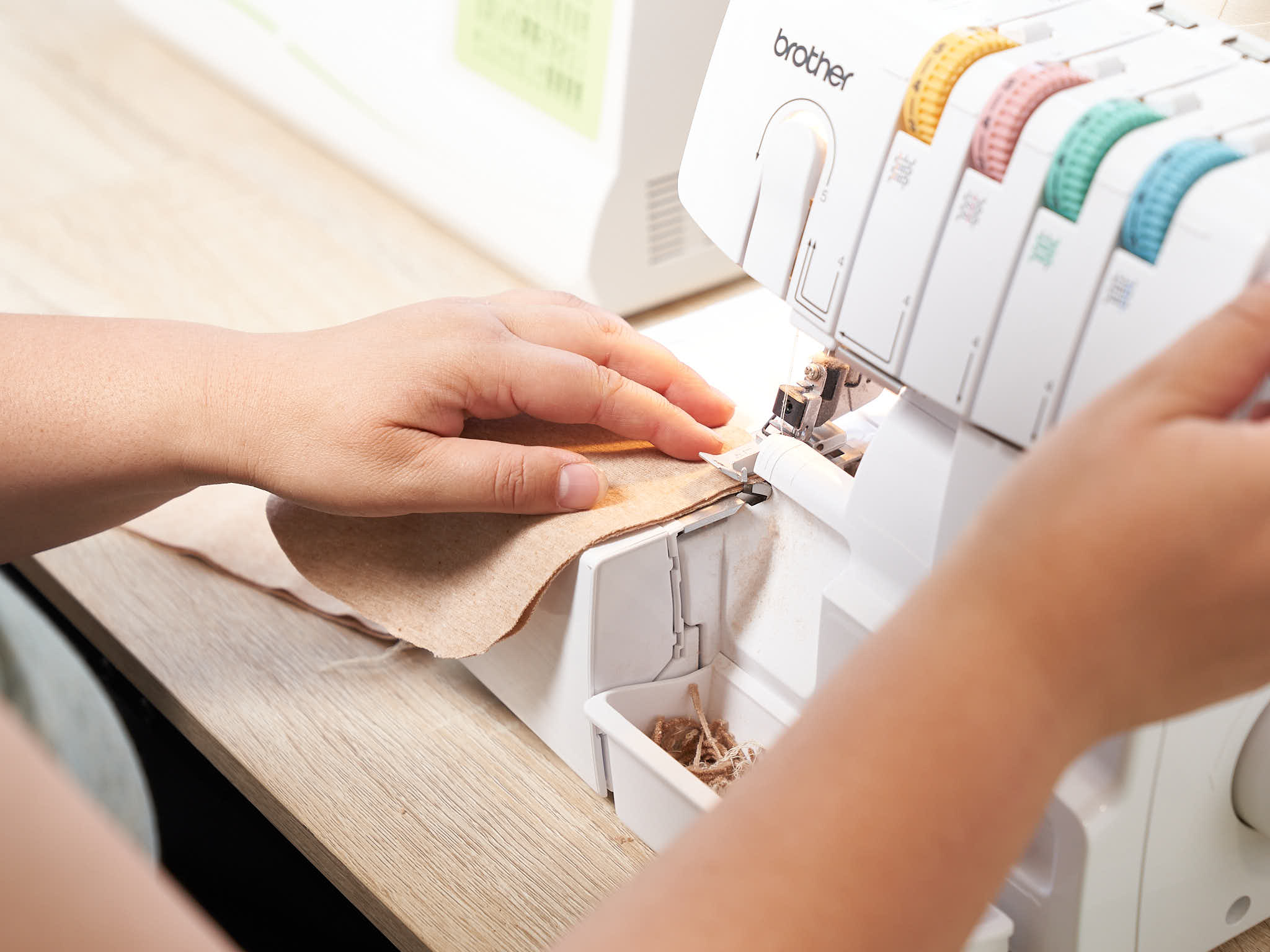
“I’d like it to be a successful experience, since trying new things can be scary. I want to be a Guide for those who want to create,” she says. In a way, she is reimagining the knitting group she held years ago, except now it’s encouraging mothers and fathers to make clothing for their families.
There’s another class in the works, too. The idea is ‘Shopping Your Closet: Reusing and Repurposing.’ Clemes wants her customers and students to draw inspiration from what is already hanging there – thereby reducing waste, approaching fashion mindfully, and being creative and resourceful.
This conscientious approach to the lifecycle of clothing is also something she plans to address through a ReLove Program, allowing her customers to send back clothing that their children have outgrown to be restored for sale and offering them a discount code for their next purchase.
With a sparkle in her eye, she says, “It’s just the start.”
And if one has spent any amount of time with Clemes, they know this to be undeniably true. She has a contagious, uplifting energy. Whatever piques her curiosity, she throws herself into it wholeheartedly. There are so many ideas and designs she has yet to create on her fiber and clothing design journey.
“I’ve been thinking about adding quilts to the homewares side of Gynna Made, but there’s a lot going on right now,” she shares, the [spinning] wheels turning in her head. “It’s not the right time.”
Yet, that is.
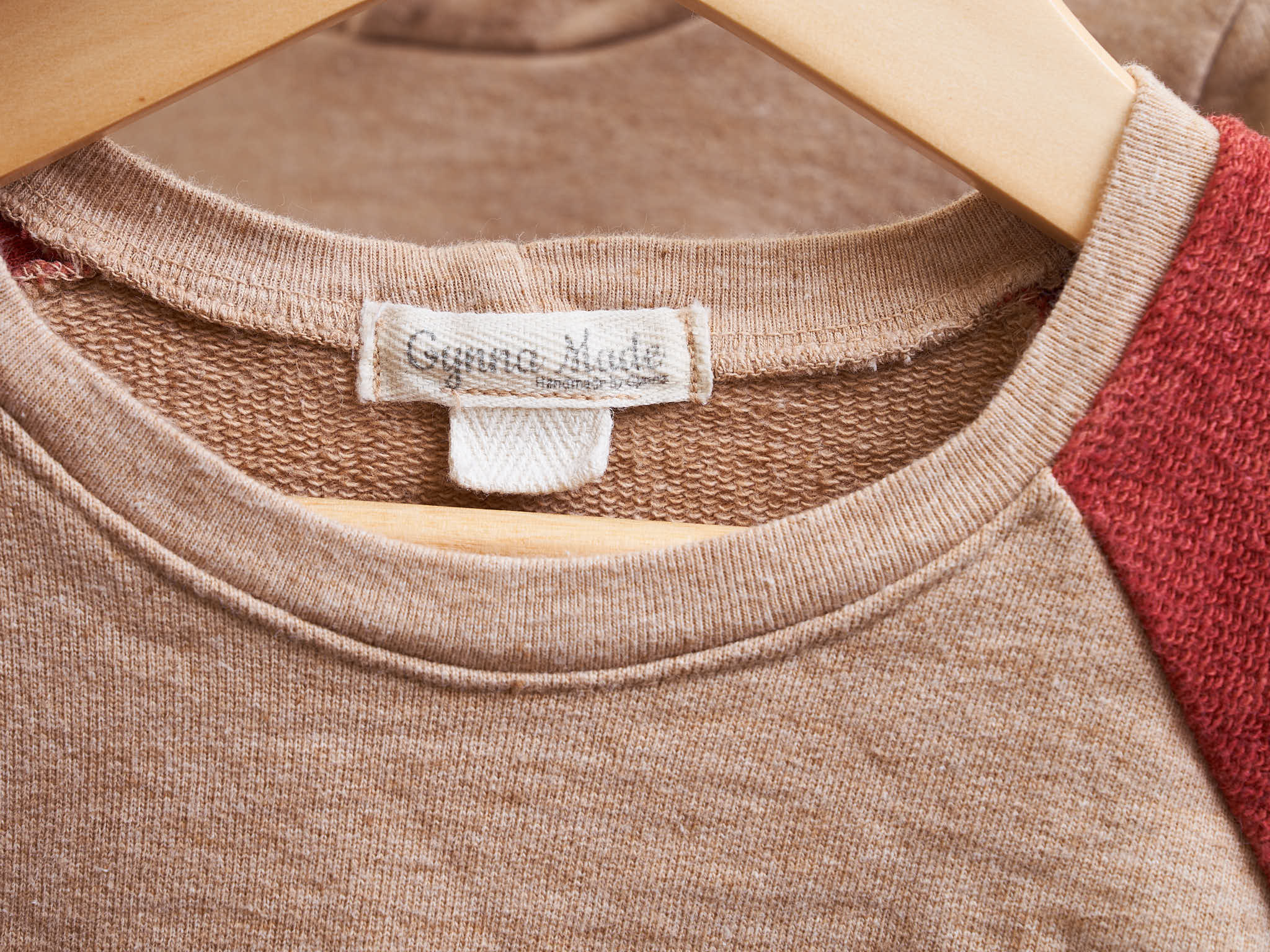
To purchase Gynna Made’s zero-waste homewares and clothing, visit www.gynnamade.com. For a day-to-day look at the life and business of Gynna Made, follow her on Instagram at @GynnaMade and @HankAndMomma.
Gynna will be teaching an in-person workshop on sourcing fabric and pattern ideas from your closet at the Fibershed Learning Center on Aug 14, 2022. To learn more and enroll: https://www.eventbrite.com/e/291068051377
